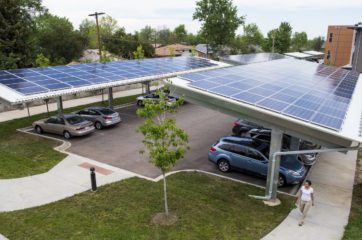Though countless reports have highlighted the grave future consequences of climate change, President Trump has done nothing about the massive existential threat but deny its existence and roll back environmental regulations.
In the wake of such inaction, state lawmakers have emerged as leaders in developing strong climate policy by establishing strong emission reduction targets and transitioning their state economies away from fossil fuels. After Trump announced the US would be withdrawing from the Paris Agreement, a bipartisan coalition of 19 governors came together to form the US Climate Alliance, announcing their commitment “to reducing greenhouse gas emissions consistent with the goals of the Paris Agreement.”
Dozens of legislators have also advocated for carbon pricing policies that would incentivize companies and individuals to transition away from fossil fuels. Movements have mobilized in Maryland, Montana, Massachusetts, Maine, Pennsylvania, and Oregon, to name a few.
At the heart of today’s carbon pricing conversation is New York. The country’s 4th most populated state and 9th biggest polluter, has introduced strong climate legislation for several years now, and momentum for such legislation is rising after the election of a majority-Democratic Senate.
Who is advocating for climate policy in New York?
New York Renews is the primary group advocating for strong climate legislation in the state. The broad-based coalition, formed in late 2015, includes more than 150 organizations — environmental, social justice, labor, and faith, among others.
The group’s big legislative push this session is the Climate and Community Protection Act (CCPA), which mandates the state entire economy be free from fossil fuels by 2050. It also requires 50% of electricity to be sourced from renewable energy by 2030.
Though the bill doesn’t put a price on carbon, it’s seen as a critical and equitable step in curbing greenhouse gas emissions. The bill prioritizes resources to be directed toward vulnerable and historically disadvantaged communities, mandating that at least 40% of climate-related revenue directly benefit these communities. In the 2019 legislative session, the CCPA was introduced by Sen. Todd Kaminsky in the Senate (S2992) and by Assemblymember Steve Englebright (A3876) in the House.
What’s next on the agenda?
While NY Renew’s first priority this session is to pass the CCPA, once that is achieved, the coalition plans to reintroduce a carbon pricing bill known as the Climate and Community Investment Act (CCIA). The CCIA, as introduced by Sen. Kevin Parker last session, imposes a $35 per carbon ton fee on carbon pollution that increases annually with inflation.
Last year’s bill language, though likely to change this year, denotes that revenue would be allocated to the following funds:
- 33% to a Community Just Transition Fund, providing targeted investments for disadvantaged communities
- 30% to a Climate Jobs and Infrastructure Fund, funding large-scale and multi-region emission reduction projects
- 30% an Energy Rebate Fund, providing tax credits and other rebates for low and middle-class New Yorkers
- 7% to Worker and Community Assurance Fund, providing aid to displaced fossil fuel workers
Before the CCIA can gain real momentum, however, NY Renews wants the CCPA to be enacted into law.
Why now?
While passing any momentous climate legislation is challenging, New York is much better positioned to do so after the state’s 2018 elections, in which Democrats earned a firm majority in the Senate (40-23) for the first time in over a decade.
Prior to that, the legislature’s ability to pass progressive legislation was stunted by the fact that eight Democratic Senators formed the Independent Democratic Conference, frequently aligning with the GOP in exchange for political and financial perks. Six of the eight Senators, were handily defeated in the September primary after receiving mounting criticism from progressive voters. That includes Sen. Jeff Klein, the controversial leader of the IDC who was overtaken by a 31-year-old progressive lawyer, Alessandra Biaggi.
This political shift indicates that New York is well-suited to enact strong climate legislation this session. Though this may not take the form of carbon pricing just yet, the groundwork has been laid and the future of the CCIA appears bright.
If you want to stay informed on state carbon pricing campaigns across the country, sign up for the State Carbon Pricing Network Newsletter here and stay tuned for future Climate XChange updates.









